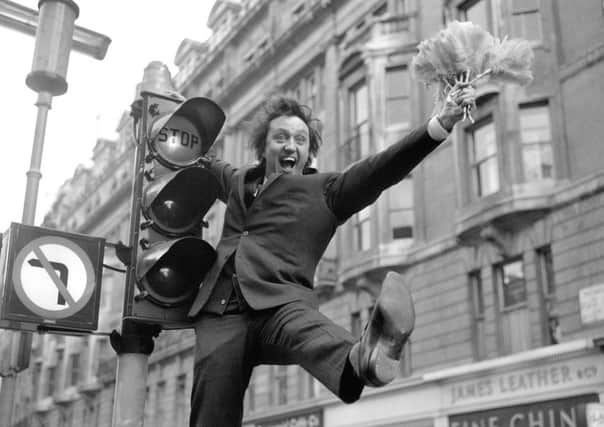How tickled he was... Knotty Ash mourns Sir Ken Dodd


The death, in the early hours yesterday morning, of Sir Ken Dodd was, everyone agreed, the only time he had left the stage too soon.
Yet his timing never deserted him. His exit came just two days after he had married his partner of 40 years, Anne Jones – now Lady Anne – in a private ceremony inside the Liverpool house that had been his only home.
Advertisement
Hide AdAdvertisement
Hide AdThe tributes came from every part of the theatre of life. In the cheap seats, contemporary comics who admired him, tweeted their praise. From the Gods, the Archbishop of Canterbury, joined the chorus. “Always friendly, always wise, always funny,” he said. “May he rest in peace and rise in glory.”
Sir Ken had left hospital on February 27 at the end of a six-week stay for a chest infection. Two months earlier he had performed what would be his final show, at the 1,350-seat auditorium in the Liverpool Echo Arena.
It capped a year in which he had been knighted in recognition of his career and charity work.
There is no tally of how many times he had walked onstage in his 90 years, but Doddy had broken so many records that numbers no longer mattered.
Advertisement
Hide AdAdvertisement
Hide AdIn was in 1965 that his career had gone stellar, with the longest-ever run at the London Palladium – 42 weeks. He was on the crest of a Mersey wave that washed ashore a new generation of entertainers for a nation finally shaking off austerity.
But Ken Dodd’s theatrical roots were deeply traditional. He had grown up watching and idolising Liverpool comedians like Arthur Askey and Tommy Handley, and when his father bought him a Punch and Judy set for his eighth birthday, he began to smell the greasepaint.
He put on puppet shows for his friends and charged them tuppence or a cigarette card to sit on orange boxes and watch.
He left school at 14 and worked with his brother Bill, heaving Arley cobbles and Houlton kitchen nuts for six years as part of his father’s business.
Advertisement
Hide AdAdvertisement
Hide AdBut in his spare time, he began singing and developing a stand-up comic routine at working men’s clubs – script by his father, costumes and general support by Mrs Dodd. He styled himself as Professor Chuckabutty. Operatic Tenor and Sausage Knotter.
His professional debut, at £75 a week, was at the Theatre Royal, Nottingham, and within two years he was topping the bill at Blackpool, with a chorus of Diddy Men.
He made it his life’s work to play every theatre in the country and more than one owes its continued existence to his patronage.
In 1981, when Leeds Council wanted to close and sell off the theatre in Guiseley it had inherited with the boundary changes, he put on a one-man show, with his fee and the proceeds all going into a fighting fund to take over the building. It thrives to this day.
Advertisement
Hide AdAdvertisement
Hide AdThe locally-resident BBC producer, Barney Colehan, had been the intermediary and had also been one of Dodd’s first supporters, putting him on the bill of The Good Old Days at the City Varieties Theatre in Leeds.
Decades later, when the theatre itself needed restoration, Sir Ken was among the backers of a campaign to raise funds. In September 2011, when the refurbished theatre opened, he was at the top of its first bill.
He also remained a favourite at Yorkshire’s seaside theatres, long after most of the big TV names had gone. Barrie Stead, a former manager at Scarborough’s Futurist, recalled booking him for a Christmas show that was so popular it was still running, twice nightly, the following Easter.
“Patrons knew they were in for a treat,” he said. “Value for money – never less than a five-hour show.”
Advertisement
Hide AdAdvertisement
Hide AdAt the Bradford Alhambra, another of Dodd’s favourites, audience members with tickets to the second house found themselves waiting in line, around the block if necessary, until he had finished the first.
Yet Ken Dodd was more than just a comedian. The self-deprecating “operatic tenor” reference on his billing notwithstanding, he was blessed with a rich baritone voice and in the 1960s enjoyed chart success which, for a while, rivalled that of The Beatles.
His play-on music was Love Is Like a Violin, but it was another signature tune, Happiness, that made him a pop star when it was released by Columbia in 1964. A follow-up, Tears (for Souvenirs), was the third highest-selling single of the decade.
Comment: Page?????